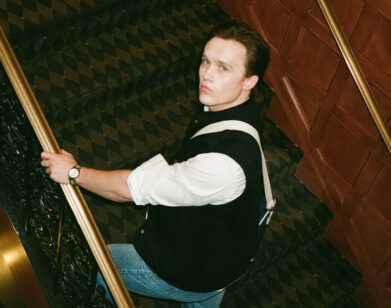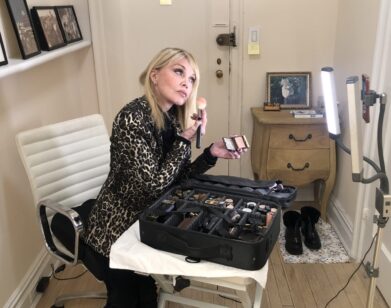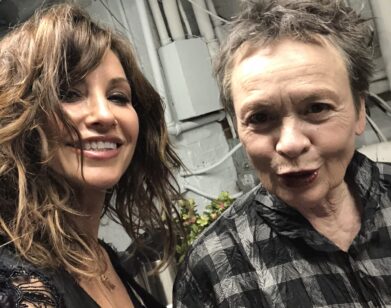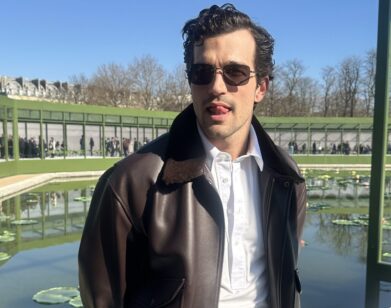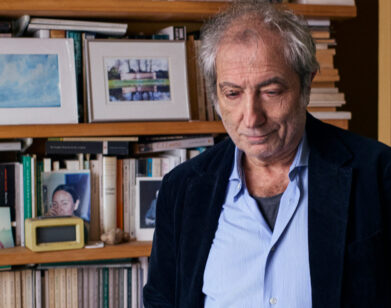Susan Nussbaum’s Social Engagement
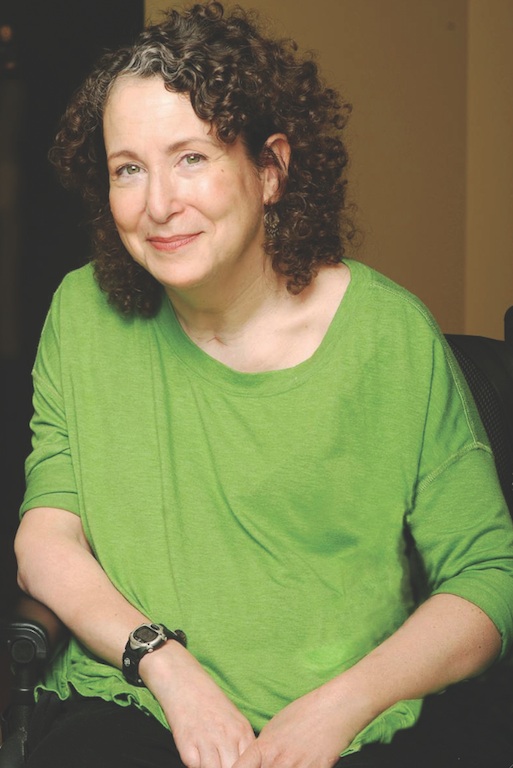
ABOVE: SUSAN NUSSBAUM. PHOTO COURTESY OF SUZANNE PLUNKETT
“The least they could do is to take care of us and make sure nobody gets beat up or raped or left in the shower by mistake and killed,” says Yessenía Lopez, perhaps the most charismatic of the eight narrators in Susan Nussbaum’s debut novel, Good Kings Bad Kings (Algonquin). It seems like a reasonable wish, but unfortunately it is just that: a dream. Yessenía lives at the Illinois Learning and Life Skills Center, an institution for children, teens, and young adults with mental and physical disabilities. She’s been at a group home and a juvenile detention center. ILLC is the last stop. Everyone at ILLC, staff or resident, is an outsider. It is what brought them to the institution; their one common element.
Nussbaum weaves in and out of her characters’ perspectives—jumping from Joanne, the well-educated, self-aware data clerk to Michelle, the naïve ILLC recruiter; Teddy, the jocular but ambitious 21-year-old with a low IQ; Mia, the introverted abused teenager. There is a bittersweet humor in the earnest thoughts of her younger characters. Yessenía announces, “if this is what it means to be award of the state, you can have your award, I don’t want it.” Teddy jokes that “Me and Bernard was just standing around… except we can’t stand. Ha.”
“That’s my whole strength—my ear,” says Nussbaum, who began her career in Chicago as an actress, and then a playwright and activist. “I’m not good at the kind of writing that I admire so much; beautifully unfolding sentences, metaphors that take you to a place where you know something is just right—that’s the way to describe it.”
EMMA BROWN: In the past you’ve talked about how one-dimensional, depressing, or unrepresentative disabled characters are in traditional literature. Have you ever come across a character who you felt was representative—someone you could actually relate to?
SUSAN NUSSBAUM: Disabled people have just not had any participation in our own representation out there in the dominant culture. We just have no agency, really. Or had no agency. That’s been our struggle for many years now. Whether or not there has been one or two respectable or accurate representations of a disabled character in books or movies over the past few centuries—it’s not even the point. We need to be our own inventors. There need to be disabled people that can break through this invisible barrier and become the writers and the shapers of this imagery, which is so damning. So very distorted. So completely off the mark. It’s painful to watch, for me. I go to a movie with a disabled character, well-armed with a friend or, usually, another disabled person so we can sit and gnash our teeth about it together and laugh about it later. There was only one movie that I ever saw where I didn’t walk out as quickly as I could to avoid, what I imagined, was the paternalism of the people around me. That was Murderball (2005), and that was a documentary and it had a bunch of real disabled people in it. They felt right to me, felt real to me.
BROWN: In Chimamanda Ngozi Adichie‘s TED talk, she talks about how she never really thought of herself as African until she went to university in America, and they put that identity upon her. It was only after being labeled “African,” that she began to feel there was a collective African experience. Do you feel like there is a collective disabled experience?
NUSSBAUM: I do. I think that for a large number of people who live in America, one becomes conscious of one’s otherness right away. It’s a very stratified country. I’m aware of my disability just about every day because every day someone will remind me of it; someone out there in the world. I’ll be just being myself and walking down the street—in my wheelchair of course—and there will be sort of evidence of my otherness. I can’t get in somewhere or more commonly it’s someone, a stranger, saying something to me that’s really paternalistic, reminding me how mainstream America sees me.
BROWN: Why did you want to write about people with both physical and mental disabilities?
NUSSBAUM: People with physical and mental disabilities are disabled. We’re not different; there’s no differences between any people in this very melting pot country. The differences are often hung on race or disability or whatever it may be, [but] I feel all disabled people have the same experiences and a lot of unity with each other. And need to really work as a group to make a change. I think disabled people need to work with African-Americans, have to work with Hispanic people. I think all of us have a lot of work to do to see things even out, opportunity-wise, in this country.
BROWN: Was it difficult to get in and out of your characters’ heads? Did you write the chapters in chronological order, or did you stay with one character throughout his or her whole narrative?
NUSSBAUM: I had never written a book and I had no idea of how hard it was. I didn’t have a scheme as to which voice, which character would come next. All I knew was if someone hadn’t been heard from in a long time, I had to get busy on that voice. I had just read David Mitchell’s amazing Cloud Atlas, which I didn’t notice how structured it was until it was over. I felt really inadequate, just totally not up to the task of doing something with rotating voices, but it worked out.
BROWN: Did you find yourself becoming more attached to certain characters?
NUSSBAUM: I think so, but there were some characters whose voices seemed to always be available to me, and there were some voices that I had to struggle for. Some of the voices are based very loosely on people I know. I would call people up and pick their brains about certain slang and make sure it was the right thing.
BROWN: I wanted to talk about Teddy. He’s such a great character. Before we meet him, Joanne describes him: “His IQ is 74 but that’s hard to believe. He’s so smart.”
NUSSBAUM: Teddy was hard to write. I did know a kid who dressed in a suit all the time; I worked with kids for many years when I was in that disability rights organization. I was constantly in Chicago public high schools. I think it was important to me that a person with an intellectual disability be represented in a way that they have not been represented—as regular people that anybody would be interested in being friends with. There are these phrases like, “The mental age of a five-year-old.” That’s absolute horseshit! People are their age—act their age. People have the same life cycles. People are sexual. People have aims and goals and dreams. It’s all the same.
BROWN: What about Michelle, who recruits children for institutions like the one in the book. Where did she come from?
NUSSBAUM: That was a big eye-opener, that there were recruiters for these places, which seemed in no danger of running short on people. I thought the character of the recruiter would be a young, ambitious person whose arc would be about her slowly growing awareness of being complicit in something that had a price. Maybe something that would be bad for her health.
BROWN: I know you’ve written plays and worked in the theater. What made you want to write a novel?
NUSSBAUM: It was what I couldn’t do with a play that forced me to write a novel. I wrote a play, the most recent play I wrote, which was quite a long time ago. It was really good, and I couldn’t get it produced. It was just wrenching for me. I thought, “This was the play. This one was gonna be it.” And I got very close with it, but I couldn’t crack it. I got really angry and stopped writing for quite a few years. And all I knew is I just wasn’t going to go through that again—sort of out of the frying pan and into the fire. I thought writing a book was going to be easier. But I got really lucky with the whole process, especially with Barbara Kingsolver stepping in the way she did.
BROWN: When Yessenía starts a protest outside her institution, she has this wonderful line about how no one is paying attention to her, apart from the occasional driver who “just looked at my cleavage or my wheelchair. I hope it’s my cleavage.” How aware is she of what she’s doing?
NUSSBAUM: I don’t think she’s really all that aware of how important it is, for sure. I tried to build to make it possible for her to come to that conclusion—to put the pieces in place in order for her to get the idea. I don’t think most people are aware of what they’re doing before they do something really dangerous or amazing. If we knew what we were doing ahead of time, not very much would happen.
BROWN: The title is pretty horrific when it’s put in context, an aide saying, “I can be a good king or I can be a bad king” to a child. Did you have the title in mind when you started writing, or did it come up through the book?
NUSSBAUM: I didn’t have a title in mind. I was constantly cutting out [newspaper] articles or doing research from law journals to make sure I was getting the full picture of these institutions. I have to say, the things that I read were so harrowing that if I had actually depicted those kinds of events in the novel, no one would have believed it. There are some places where people are institutionalized that are not bad, [but], to me, the whole idea of an institution has run its course. It’s a bad idea; it was never really a good idea. The title came out of an article I read about a boy who was institutionalized at a place for kids with multiple disabilities. He was maybe eight or 10 at the time. He was being driven somewhere. There were two aides in the van with him—one was driving, the other was in the back seat with this boy. The little boy began to jump out of the car seat, so the other aide grabbed him, laid him out flat on the back seat of the van facedown. That’s called a takedown, it’s a fairly commonplace way of subduing a person of any age who is viewed as not under control. The aide straddled this little boy around his torso. And the aide who was driving the van testified that the little boy struggled, of course, and that he heard the aide on top of the boy say, “I can be a good king or I can be a bad king.” And of course the little boy’s lungs were crushed and he was killed. That was where I got the title. The title goes to the power adults have over children in this world. When there is no emotional connection between the adult who is in charge of that child and the kid himself, then things can get pretty dangerous.
BROWN: Did you ever have to stop writing the book because it was too upsetting?
NUSSBAUM: I think that’s what made me write, actually. That’s what gave me the impetus in the first place.
BROWN: Do you think art is inherently political?
NUSSBAUM: No, but I’m not sure. It’s bad art if it’s hitting you over the head—that much we can all agree on, I think. You’ve got to make up your mind: are you going to let the politics lead you or are you going to let the organic, real impetus lead.
BROWN: Who is the first person you showed the very first chapter to?
NUSSBAUM: It was one of my best friends, Jim Charlton, a disabled guy and a great activist, real funny too. He was very encouraging. But most of the time it’s my sister. I really trusted her to tell me the truth. People always say, “It’s great, it’s great,” but it’s hard for me to believe in positive feedback like that. I know it’s not great; I just need to hear what works and what doesn’t.
BROWN: When did you start believing that maybe it is great?
NUSSBAUM: Well, I still don’t believe it’s great. I’m not a great writer like people who you think of as great writers. That’s not me. But I’m proud of this book and I think that it does something different—it’s possibly one of the first novels out written by a disabled person that deals with disability but not in a bludgeoning, guilt-tripping, victim-villain kind of way.
GOOD KINGS AND BAD KINGS WAS AWARDED THE 2012 PEN/BELLWETHER PRIZE FOR SOCIALLY ENGAGED FICTION. IT WILL BE RELEASED NEXT WEEK, ON TUESDAY, MAY 28.


